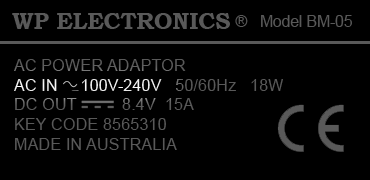Which plug adaptor do I need when travelling from Central African Republic to Brazil?
Summary
The table below summarises the plug types, voltage and frequency of electrical current in both Central African Republic and Brazil.
| Central African Republic | Brazil | |
|---|---|---|
| Plug Types | C, E | A, B, C, N |
| Voltage | 220V | 110V, 220V |
| Frequency of electrical current | 50Hz | 60Hz |
Plug Adaptors
In Central African Republic there's more than one plug type in use.
What type of plug does your appliance have?
Your Appliance has Plug Type C
In Brazil there's more than one socket type in use. You may require more than one adaptor.
Socket Type C
(Central African Republic) to Plug Type A
(Brazil)
Socket Type C
(Central African Republic) to Plug Type B
(Brazil)
Socket Type C
(Central African Republic) to Plug Type N
(Brazil)
Brazil also uses Socket Type C, which is used in Central African Republic. If using an appliance that has a Type C Plug in the Type C Sockets of Brazil, you will not need an adaptor.
Your Appliance has Plug Type E
In Brazil there's more than one socket type in use. You may require more than one adaptor.
Socket Type E
(Central African Republic) to Plug Type A
(Brazil)
Socket Type E
(Central African Republic) to Plug Type B
(Brazil)
Socket Type E
(Central African Republic) to Plug Type C
(Brazil)
Socket Type E
(Central African Republic) to Plug Type N
(Brazil)
Warnings
Voltage
Check if your appliance is compatible with the voltages used in Brazil
The voltage, 110V, is used in parts of Brazil but not in Central African Republic.
Some appliances are compatible with multiple voltages. To find out if your appliance is one of them, check the appliance label and/or instruction booklet. An example appliance label is below.

See examples of appliance labels
Is your appliance compatible with the voltages used in Brazil (110V and 220V)?
If your appliance is not compatible with multiple voltages, and you wish to use it in parts of Brazil where this voltage is present, you will need a transformer to adjust the voltage input when using your appliance in Brazil.
Considerations
Frequency of Electrical Current
The frequency of electrical current found in Central African Republic (50Hz) differs to that found in Brazil (60Hz).
Most equipment is not affected by differences in frequencies. Some exceptions are:
- Electric clocks: Some electric clocks use the frequency of electrical current to measure time. If the clock is designed for one frequency, but used with another, time shifts could be experienced.
- Appliances using motors: If there is a motor load associated with an appliance, the frequency governs the speed in revolutions of the motor. This could mean that the motor will spin faster, or slower than intended and could have a detrimental effect in the appliance's operation. This is of particular concern in power tools and other machinery that uses motors, so if you must use these, you should seek access to a frequency converter.

